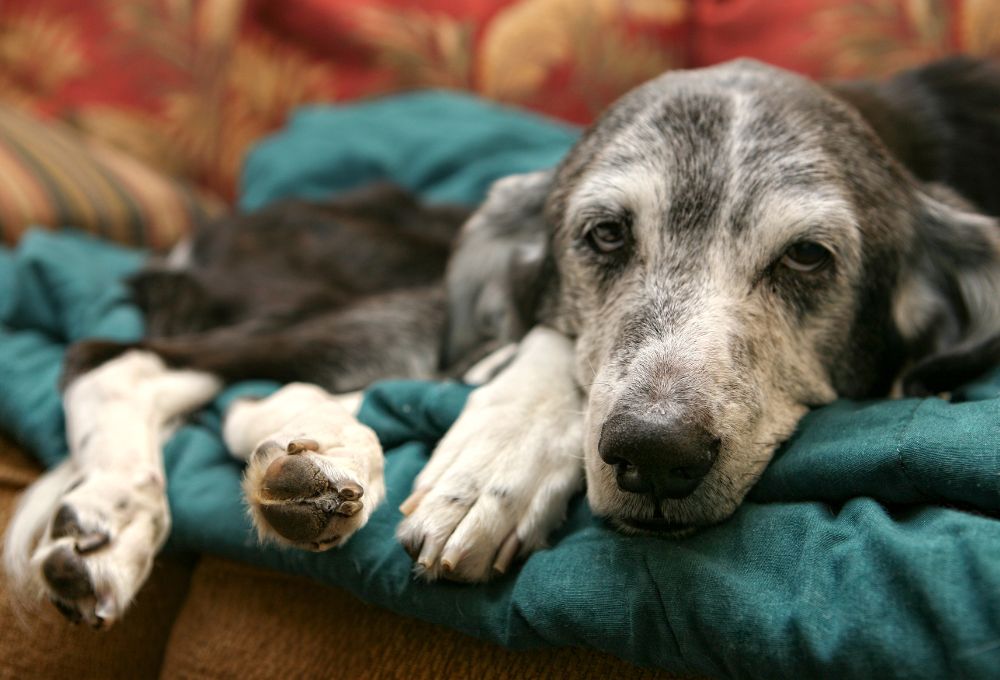
Anticipatory grief arises when we realize that our dog’s life is approaching its end. The process of saying goodbye to your senior dog can be particularly heartbreaking because they have been part of your family for 10+ years.
Acknowledging your dog’s mortality is hard. It seems unfair that they only get to live “so little” in comparison to the human span of life. I like to think that is because they come to teach us in a fast-paced format, like a BootCamp, and even when they are gone, their unconditional love and lessons will remain with us.
As my family is going through similar times, I am writing this article to remind us and you that we are not alone in this process, and hoping to find guidance and comfort during this difficult time for everyone.
The Bond Between Senior Dogs and Their Parents
Senior dogs have been by our side through ups and downs. As they age, this bond often deepens, and the connection becomes even more meaningful.
One aspect of the bond with senior dogs is the level of understanding and communication. Over the years, we become attuned to their needs, preferences, and behaviors. They, in return, learn to interpret our cues, expressions, and emotions. This unspoken language forms a strong foundation for the relationship.
The bond between senior dogs and their parents is also characterized by a mutual sense of companionship and emotional support. Our dogs have an innate ability to sense and respond to their human companion’s emotions. They can provide comfort during times of sadness, be a source of joy and laughter, and offer a constant presence that brings solace.
Understanding Anticipatory Grief
Anticipatory grief occurs before the actual loss takes place, as a response to the awareness that our senior dogs are approaching the end of their lives. This phase is often characterized by a mix of emotions, including sadness, anxiety, guilt, and even relief. Parents of senior dogs may find themselves preoccupied with thoughts of their pet’s declining health or the decision of euthanasia.
Understanding anticipatory grief involves acknowledging its various stages. These stages can include denial, anger, depression, and acceptance. However, not everyone will experience these stages in a linear way. Grief is a deeply personal process, and each individual may navigate it differently.
If you are going through anticipatory grief, know that there are some strategies that can help you cope:
- Give yourself permission to grieve: Start by recognizing and accepting the emotions you are experiencing and give yourself time to process them.
- Focus on the present: Spoil your pet, provide company, create new memories, and be there to support your dog despite the difficult times.
- Discuss end-of-life options for your dog: Your vet can help you design hospice care to keep them comfortable.
- Ask for help: Acknowledge when the situation is too much to handle by you. Reach out to friends and family for, not only moral support, but practical help, such as cleaning, pet sitting, or driving to the vet.
Recognizing the Signs of Pet Loss Grief
Grief is a natural response to loss, and the loss of a pet can evoke a wide range of emotions. Start your healing process by recognizing and validating these feelings.
One of the common signs of pet loss grief is profound sadness. The loss of a senior dog can leave a significant void in our lives, and it is natural to feel a deep sense of sorrow and longing. This sadness may be accompanied by feelings of emptiness, loneliness, and even guilt for not being able to prevent the loss.
Another sign of grief is a change in appetite and sleep patterns. Some people may experience loss of appetite or difficulty sleeping. Others may seek comfort through food.
Grief can also manifest in physical symptoms such as fatigue, headaches, or even a weakened immune system. The stress and emotional burden can take a toll on our overall well-being. It is important to prioritize self-care during this time and seek support from loved ones or professionals if needed.
Feelings of guilt and regret are common in grief. Dog parents may question whether they did enough for them or harbor guilt over difficult decisions, such as euthanasia. Remember that these decisions are made out of love and in the best interest of our dogs’ well-being.
The stages of grief may vary in degrees and order because is a deeply personal process, and there is no “right” or “wrong” way to grieve.
Coping Strategies for Senior Dog Parents
Here are various coping strategies to help you cope during the grieving process. Give them a try and stick to what works best for you.
- Acknowledge Your Emotions: Whether it’s through writing in a journal, talking to a trusted friend or family member, or seeking professional counseling.
- Create Rituals and Memorials: These could be a photo album, a scrapbook, or a memory box filled with cherished mementos. You can also plant a tree or dedicate a space in your home or garden as a tribute to your furry companion.
- Practice Self-Care: Engage in activities that bring you comfort and joy, such as spending time in nature, practicing mindfulness or meditation, or engaging in old hobbies.
- Seek Support from Understanding Communities: Join support groups or online forums where you can share your feelings and get comfort and validation.
- Celebrate Your Senior Dog’s Life: Shift your focus from the loss to celebrating the beautiful life and memories you shared with your senior dog. Share stories, photos, and anecdotes that bring laughter and warmth to your heart.
- Explore Creative Outlets: Consider expressing your emotions through art, writing, or music.
- Allow Yourself Time to Heal: Be patient with yourself and understand that there is no set timeline for the grieving process. Allow yourself to experience the waves of emotions as they come and trust that, with time, the pain will gradually give way to cherished memories and a sense of peace.
Honoring Your Senior Dog’s Legacy
We also invite you to reflect on the healing power of memories and the impact your senior dog has had on your life. While their physical presence may no longer be with you, their memory and spirit live forever in your heart.
- Embrace Fond Memories: Take time to revisit cherished memories of your senior dog. Flip through photo albums, watch videos, or simply close your eyes and recall the moments that brought you joy and laughter. Allow yourself to smile, feel their presence, and be grateful for the time you shared.
- Create a Memory Box: Gather mementos, such as their collar, a favorite toy, or a lock of fur, and create a special memory box. This tangible collection of keepsakes can serve as a source of comfort and a reminder of the love and happiness you experienced together.
- Write a Tribute: Put your emotions into words by writing a heartfelt tribute to your senior dog. Express your gratitude for their unconditional love, the lessons they taught you, and the beautiful memories you hold dear. Share this tribute with loved ones or keep it as a private tribute to your dog.
- Capture Their Story: Consider writing a memoir or a short story that captures the unique bond you shared with your senior dog. Share their quirks, adventures, and the lessons they taught you.
Helping Others
We also recommend channeling your grieving energy into helping others who are facing similar experiences:
- Volunteer at Animal Shelters: Assist with tasks such as walking dogs, socializing animals, or helping with administrative work.
- Foster a Senior Dog: Consider opening your home to foster a senior dog. Offer them a second chance at a happy life while honoring your own senior dog’s memory.
- Support Senior Dog Adoption: Spread awareness through social media, community events, or volunteering at adoption drives. Encourage potential adopters to consider the love and loyalty that senior dogs can bring to their lives.
- Educate Others: Share your knowledge and experience of senior dog care by offering educational workshops or writing articles. You can help dispel myths and encourage compassionate care for older dogs.
- Organize Fundraisers: Support organizations dedicated to senior dog care or pet bereavement services.
- Offer Support to Senior Dog Parents: Reach out to other senior dog parents who may be experiencing grief or struggling with the challenges of caring for aging pets. Share your own journey and offer a listening ear, guidance, and empathy.
Final Thoughts
Remember that the bond you shared with your senior dog transcends the physical realm. Their memory and the love they brought into your life will forever be a part of who you are. Take comfort in knowing that their legacy lives on in your heart and in the lives of those you touch with your own acts of love and compassion.
Recent Posts
Amazon's Top Black Friday and Cyber Monday Deals for 2024: Dog Products Edition
The holiday shopping season has officially started and Amazon has already released some incredible deals on pet products for Black Friday and Cyber Monday 2024. Here is our curated list of the...
As someone who boards dogs as a side gig, I am used to seeing many pet trackers and smart collars these days. These devices have become a must-have tool for pet owners (especially when trusting their...
